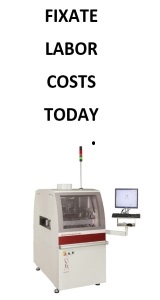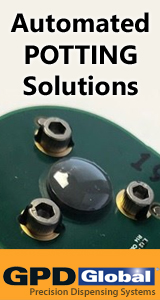| | | | Can someone suggest what material I have to use to protect components by electrical discharge on ptfe based boards? | | | | It should have high resistivity, thermal stability (-40 +70 'C),perfect adherence on ptfe... | | | | Many tahnks | | | | | | | Don't know what you are trying to accomplish here. Not clear on "electrical discharge" statement; do you mean dendritic growth? How about getting some uncured mask and instructions for manual application / curing from your board supplier? I think Taiyo might work well with teflon substrates...... | | | | | | If you mean you have a harsh environment product, you might consider one of the newer one-part silicone based conformal coatings (Dow Corning or GE can help). | | | | | | If you seek other info, please be a bit more specific. | | | | | | Scott | | | | | | | | I agree with Scott that your question is ambiguous. PTFE is almost impossible to adhere to without a primer which will chemically attack the surface (and the components!). Conformal coating on PTFE will defeat the purpose of using PTFE, as the electrical qualities of all conformal coatings will be far inferior to that of the substrate itself, by orders of magnitude. Also adhesion is quasi impossible. If it is a must, I think I would consider Parylene, but I'm not sure how it would adhere: I think it may just be OK provided that the plasma drawn prior to evaporation is such that it will have sufficient energy to destroy the superficial carbon-fluorine bonds. Even so, it is electrically inferior to PTFE. An alternative, which will be infinitely better, if less practical, is to immerse the whole board in a perfluorocarbon liquid: this has equivalent electrical properties to PTFE (itself a polymer of a perfluorocarbon), is chemically inert for thousands of years and is a good thermal conductor. The hic is that such liquids are very expensive and may become targeted under the Kyoto Protocol as terrible global warmers (c. 10 000 times worse than CO2). | | | | Brian | | | Really sorry , | was not my intention to confuse you, I will try to explain me better; we have assebled PTFE boards on which, during working, there was an electrical discharge between two points and one of them is a component we would like to insulate. I' m looking for an insulating compound that could have good adherence on ptfe in conditions I spoke about before. | THanks again and apologize for my hurried question. | G.D. | Gian
At the risk of being obtuse, I think what you need is a conductive condition which will prevent the discharge and not a hypothetical insulation to contain it. There may be two ways to achieve this: the simplest is to direct clean water-saturated air to around the work places where discharge is a risk. With this, it would be unlikely for any static to accumulate to dangerous levels. Centrifugal humidifiers would be the best. The other would be to apply some conductive material to the assemblies and which can be easily removed at the end of the line. My first reaction would be to spray a fine mist of an anionic detergent over the boards: a water wash will remove it and it should not cause a loss of SIR after cleaning. Even so, you would require about 60% RH or more in the working areas, because this method would depend on the hygroscopicity of the surfactant.
IMHO, applying any insulant would defeat the purpose of PTFE boards, by lowering insulation resistance, poorer HF characteristics, higher dielectric constant, higher PFs, etc.
Hope this helps
Brian
PS Where are you? If you are in the middle of the Arizona desert or similar, you may have more problems than in Washington State, where it rains only once a year - for 365 days!
reply »
![]()
![]() Can someone suggest what material I have to use to protect...
- Oct 01, 1999
by
Gian.D
Can someone suggest what material I have to use to protect...
- Oct 01, 1999
by
Gian.D
![]()
![]()
![]() | Can someone suggest what material I have to use to prote...
- Oct 01, 1999
by
Scott Cook
| Can someone suggest what material I have to use to prote...
- Oct 01, 1999
by
Scott Cook
![]()
![]()
![]() | | Can someone suggest what material I have to use to pro...
- Oct 02, 1999
by
| | Can someone suggest what material I have to use to pro...
- Oct 02, 1999
by
![]()
![]() | | | Can someone suggest what material I have to use to p...
- Oct 04, 1999
by
Gian.D
| | | Can someone suggest what material I have to use to p...
- Oct 04, 1999
by
Gian.D
![]()
![]()
![]() | | | | Can someone suggest what material I have to use to...
- Oct 05, 1999
by
| | | | Can someone suggest what material I have to use to...
- Oct 05, 1999
by
![]()
![]() | | | | Can someone suggest what material I have to use to...
- Oct 06, 1999
by
davef
| | | | Can someone suggest what material I have to use to...
- Oct 06, 1999
by
davef
![]()






